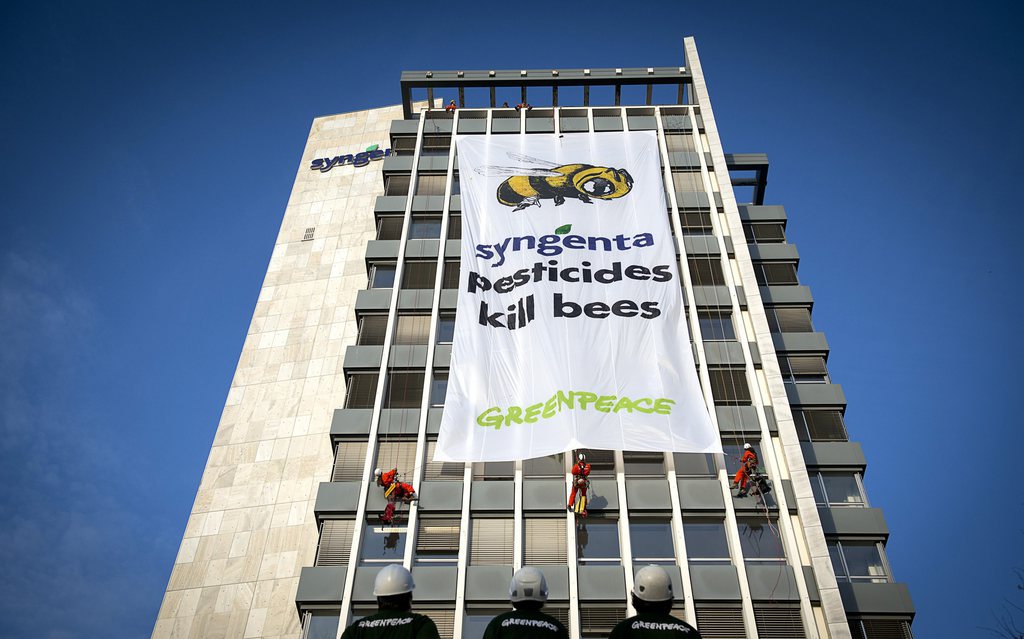
EU, Switzerland to suspend use of pesticides

The European Union said on Monday it will suspend the use of three of the world's most widely-used pesticides for two years because of fears they are linked to a plunge in bee populations.
The European Commission will impose a temporary ban of a class of pesticides known as neonicotinoids effective from the beginning of December.The Federal Office for National Economic Supply said it will follow suit.
The ban will affect the use of the substances on all crops, excluding winter cereals and plants, which are not attractive to bees or harvested before bloom, such as beet and salad.
The pesticides, which are widely used to protect rapeseed and maize from aphids and other pests, are mainly produced by Basel-based Syngenta and Germany’s Bayer. A ban would shift demand to alternative substances, whose effects on bee populations are largely unknown.
There is disagreement among scientists whether the chemicals actually pose a risk to honeybees, which pollinate many crops. Greenpeace Switzerland welcomed the decision by the European Commission and the Swiss government to ban the substances.
“The protection of bees, however, stands and falls with the concrete implementation, which is up to this point in time not yet completely defined,” said Greenpeace’s agricultural expert Marianne Künzle.
The office continues to ignore “that even the slightest amounts of the substances may be harmful for the bees”, Künzle said in a statement.
Small safety margin
The Swiss agricultural office said it will in line with the EU suspend the use of these neonicotinoids. “The safety margin is considered small, despite the fact that these pesticides do not constitute an unacceptable risk for bees – if used according to instructions,” the office said in a press release.
So far, no harm to bees has been observed due to the chemicals imidacloprid, clothianidin und thiametoxam, which are used to pretreat the crops before seeding so that the young plants are resistant against pests and spray applications can be avoided, the Swiss office said. Unlike in the EU, there is also no one-crop farming in Switzerland, it said.
Pesticide manufacturer Syngenta, the world’s largest maker of crop chemicals, reiterated today that there is no proof of a link between the use of the pesticides and the sharp decline in bee numbers observed in Europe over recent years. The Basel-based company said the decline of bees is due to a loss of habitat, diseases, viruses and nutrition.
“The proposal is based on poor science and ignores a wealth of evidence from the field that these pesticides do not damage the health of bees,” Syngenta Chief Operating Officer John Atkin said in a statement.
Syngenta said that the European Food Safety Agency made fundamental mistakes including a “serious over-estimation” of the amount of pesticide bees are exposed to in the field. The agency ignored key studies and independent monitoring, which found no evidence that neonicotinoids impact bee health, the Swiss company said.

In compliance with the JTI standards
More: SWI swissinfo.ch certified by the Journalism Trust Initiative















![The four-metre-long painting "Sonntag der Bergbauern" [Sunday of the Mountain Farmers, 1923-24/26] had to be removed by a crane from the German Chancellery in Berlin for the exhibition in Bern.](https://www.swissinfo.ch/content/wp-content/uploads/sites/13/2025/12/01_Pressebild_KirchnerxKirchner.jpg?ver=f05a5a9c)














You can find an overview of ongoing debates with our journalists here . Please join us!
If you want to start a conversation about a topic raised in this article or want to report factual errors, email us at english@swissinfo.ch.